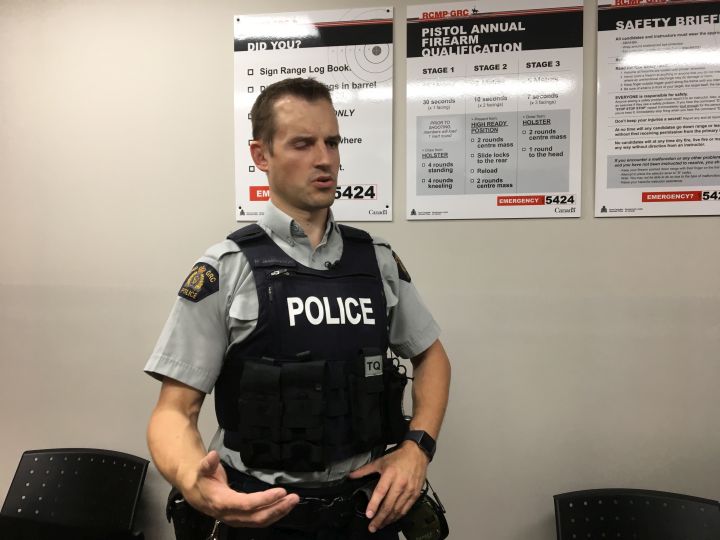First Const. Michael Jaszczyszyn had to survive a rare cancer that stole the vision in his right eye. Then he had to challenge national RCMP policy to get his job back.

“It seemed like such an insurmountable task,” he told Global News this week. “It had never been done before.
“They’ve never had someone in the RCMP with permanent blindness in one eye do frontline policing — ever.”
Jaszczyszyn discovered he had a tumour behind his right eye in 2012, after noticing blurred vision. The then-25-year-old underwent two surgeries and radiation, but the rare optic nerve glioma continued to grow rapidly.
“[Doctors] had said, ‘You know this is going to go into palliative care. Unfortunately, we don’t believe you’ll survive this,” Jaszczyszyn said.
But in a marathon surgery, the team at the Eye Institute of Alberta managed to remove the entire optic nerve. That saved his life, but not his vision. He is blind in his right eye.
READ MORE: Blind Alberta woman to receive eye tissue donation from sister

Get weekly health news
In 2014, Jaszczyszyn returned to the RCMP but was restricted to desk duty.
“I just didn’t accept that. I knew I could do the job, I wanted to do it, I missed it so much… it’s all I wanted to do.”
So he re-did all of his training, plus some advanced courses. He also taught himself to shoot a rifle on his left side. And he started practising Brazilian jiu-jitsu to help with his depth perception.
Jaszczyszyn’s ocular oncologist explains people with one eye can retrain their brain.
“The depth perception for short distances can be affected, but not for long distances,” Dr. Ezekiel Weis said. “There are many cues that a person can learn to overcome that.”
Weis wrote letters of support for his patient while Jaszczyszyn gathered piles of research on monocular vision and policing. He interviewed a number of one-eyed officers in the U.S.
Four years after losing his vision, Jaszczyszyn was permitted to return to front-line policing full-time in December of 2017.
“I was just in tears,” Jaszczyszyn recalled with a smile.
The 31-year-old does everything any other constable does, including driving in high-speed chases.
“I will literally catch myself smiling… I think to myself, ‘I can’t believe I’m doing this again.'”
“He’s quite a role-model and I bring his example up to many patients who are in similar situations and what can be accomplished,” Weis said.
Since his precedent-setting case, Jaszczyszyn says he has learned of two other Canadian officers with vision issues who have returned to active duty.









Comments